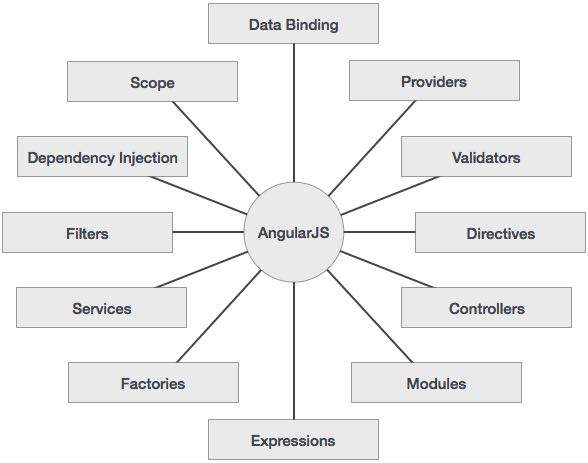Angular Js Core Features

Following are most important core features of AngularJS −
- Data-binding − It is the automatic synchronization of data between model and view components.
- Scope − These are objects that refer to the model. They act as a glue between controller and view.
- Controller − These are JavaScript functions that are bound to a particular scope.
- Services − AngularJS come with several built-in services for example $https: to make a XMLHttpRequests. These are singleton objects which are instantiated only once in app.
- Filters − These select a subset of items from an array and returns a new array.
- Directives − Directives are markers on DOM elements (such as elements, attributes, css, and more). These can be used to create custom HTML tags that serve as new, custom widgets. AngularJS has built-in directives (ngBind, ngModel...)
- Templates − These are the rendered view with information from the controller and model. These can be a single file (like index.html) or multiple views in one page using "partials".
- Routing − It is concept of switching views.
- Model View Whatever − MVC is a design pattern for dividing an application into different parts (called Model, View and Controller), each with distinct responsibilities. AngularJS does not implement MVC in the traditional sense, but rather something closer to MVVM (Model-View-ViewModel). The Angular JS team refers it humorously as Model View Whatever.
- Deep Linking − Deep linking allows you to encode the state of application in the URL so that it can be bookmarked. The application can then be restored from the URL to the same state.
- Dependency Injection − AngularJS has a built-in dependency injection subsystem that helps the developer by making the application easier to develop, understand, and test.
Concepts
Following diagram depicts some important parts of AngularJS which we will discuss in detail in the subsequent chapters.

Advantages of AngularJS
- AngularJS provides capability to create Single Page Application in a very clean and maintainable way.
- AngularJS provides data binding capability to HTML thus giving user a rich and responsive experience
- AngularJS code is unit testable.
- AngularJS uses dependency injection and make use of separation of concerns.
- AngularJS provides reusable components.
- With AngularJS, developer write less code and get more functionality.
- In AngularJS, views are pure html pages, and controllers written in JavaScript do the business processing.
On top of everything, AngularJS applications can run on all major browsers and smart phones including Android and iOS based phones/tablets.
Disadvantages of AngularJS
Though AngularJS comes with lots of plus points but same time we should consider the following points −
- Not Secure − Being JavaScript only framework, application written in AngularJS are not safe. Server side authentication and authorization is must to keep an application secure.
- Not degradable − If your application user disables JavaScript then user will just see the basic page and nothing more.
The AngularJS Components
The AngularJS framework can be divided into following three major parts −
- ng-app − This directive defines and links an AngularJS application to HTML.
- ng-model − This directive binds the values of AngularJS application data to HTML input controls.
- ng-bind − This directive binds the AngularJS Application data to HTML tags.
No comments:
Post a Comment